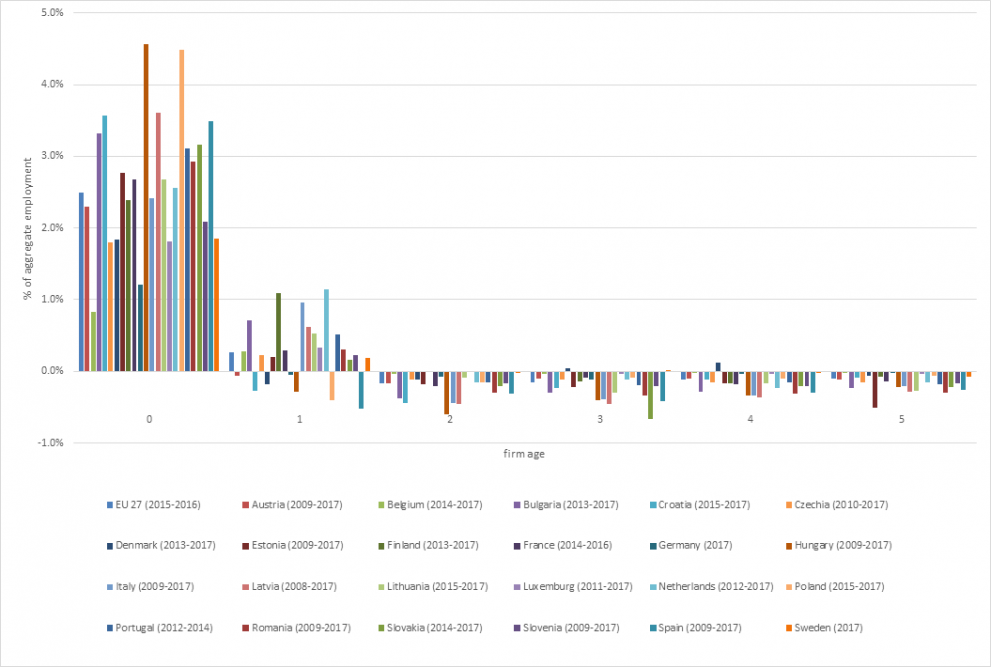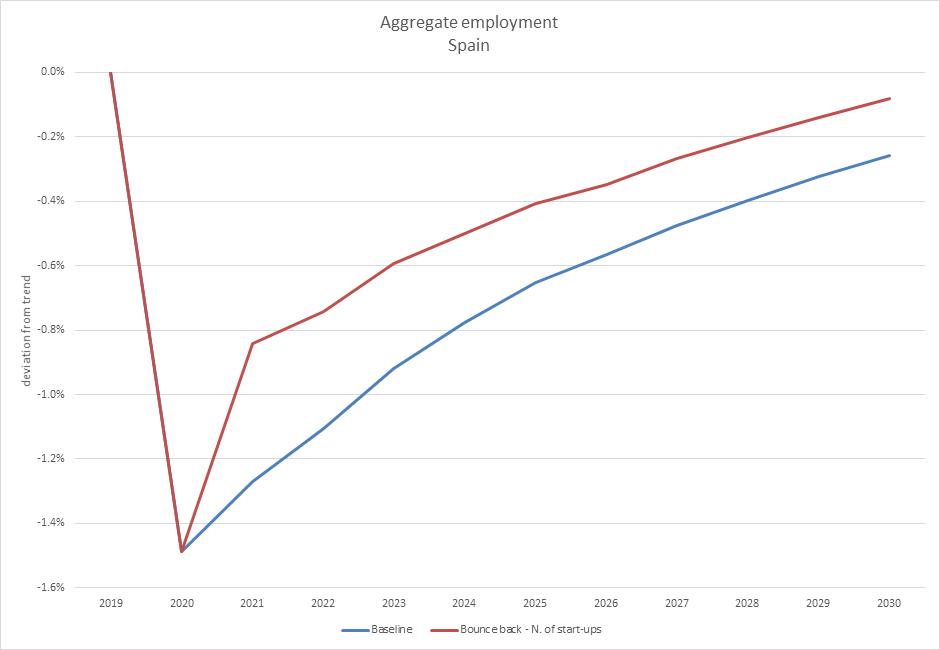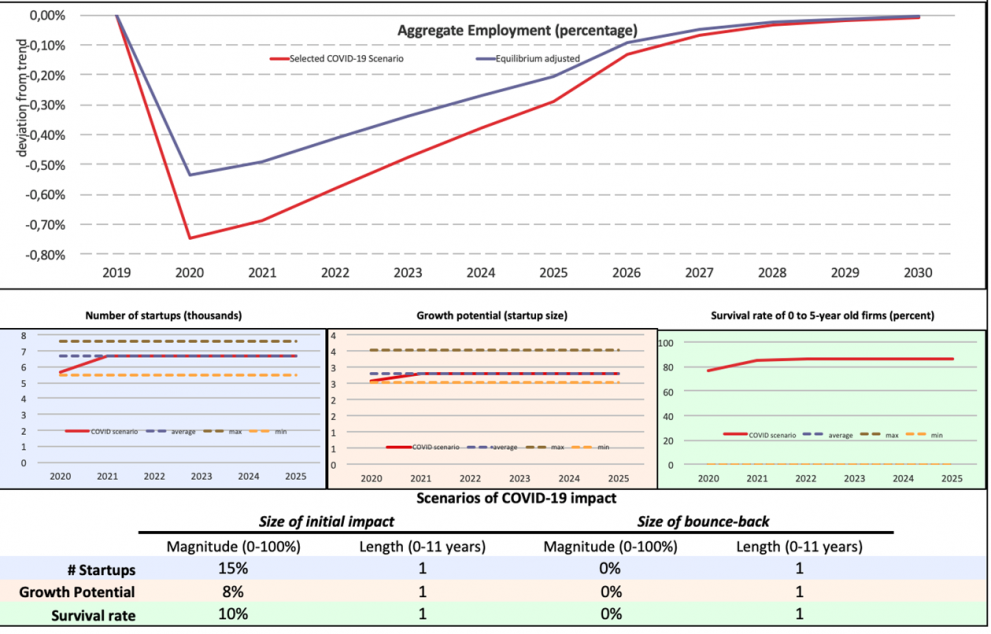
The disruption to new businesses caused by the coronavirus pandemic will have a big and lasting impact on job growth in the EU, according to JRC projections.
However, policies to help young firms survive and support the creation of new businesses could mitigate these impacts, protecting more than 3.5M jobs that may not otherwise be created over the next ten years.
JRC experts developed a ‘start-up calculator’ to make these projections, which simulate the impact on jobs between 2021-2030 of disruption to start-up activity across 23 EU countries for which data is available.
While several different definitions, approaches and methodologies related to start-ups exist and are used in different contexts, the calculator defines ‘start-up’ as any newly created firms aged zero. It takes as its baseline scenario a strong, short-lived crisis generating significant and persistent job losses in all 23 countries, ranging from 0.7% to 4.5% below the expected trend before the pandemic hit.
Start-ups are pivotal for the creation of new jobs, so a lack of start-up activity can lead to significant loss of aggregate employment. Across all EU countries, young firms (businesses under six years old) accounted for 36% of employment growth between 2013 and 2017.
‘Net job creation’ (the number of new jobs created vs. jobs lost) is highest in firms under one year old. On average, the share of the workforce employed in start-ups ranges from 0.8% in Belgium to 4.6% in Hungary.

Net job creation by firm age (Source: JRC, Eurostat, Business Demography dataset, 2020)
Analyses carried out using the calculator find that a lower survival rate of young firms will have the biggest impact on jobs across most of the countries assessed.
Therefore, policies to support young firms and incentivise the creation of new ones could help to mitigate the medium-term effect of the pandemic.
How the calculator works
The start-up calculator takes three variables into account: the number of start-ups, their growth potential and the rate of young firms going out of business in their first five years (known as the ‘exit rate’).
These variables can be updated to include real-time data or to project the potential impact of policies designed to impact one or more of the variables. In doing so, the calculator can help policymakers create their own scenarios and assess the interventions that are most likely to have a positive impact on employment in the medium term, for any of the 23 countries covered.
Bounce-back scenarios, where the number of firms entering the economy rapidly increases in 2021, significantly improve the outlook in every country: recovery is faster and aggregate job loss is lower.

Aggregate employment in the benchmark scenario vs the bounce back in the number of start-ups scenario – example for Spain (Source: JRC, EU start-up calculator, Spain, 2020)
Calculating the impacts across countries and sectors
The calculator’s baseline scenario generates important and persistent job losses in all countries assessed. Potential cumulative job loss ranges from 59,000 (in Estonia) to 1,186,000 (in Italy) for the period 2020-2030.
According to analyses carried out using the calculator, the pandemic is likely to hit the service sector (tourism, hospitality, transport) hardest, where start-ups and young firms are important job creators.
The potential negative impact is particularly high in Austria, Estonia, France, Hungary, Italy, Latvia, Lithuania, Portugal and Spain, mainly in service sectors characterised by high firm turnover and a reliance on start-ups and young firms for job creation.
Other countries, such as Belgium, which have a lower entry and exit rate for young firms and more reliance on established firms for job creation, are likely to be less impacted by the disruption to start-up activity.

Scenario analysis for employment and the three margins of start-up activity: the example of Belgium. The size of the initial impact and bounce-back can adjusted in terms of length and magnitude, generating a projection on the resulting impact on overall employment up to 2030. (Source: EU start-up calculator, Belgium, 2020)
The 23 EU countries covered by the calculator are: Austria, Belgium, Bulgaria, Croatia, Czechia, Denmark, Estonia, Finland, France, Germany, Hungary, Italy, Latvia, Lithuania, Luxembourg, the Netherlands, Poland, Portugal, Romania, Slovenia, Slovakia, Spain and Sweden.
EU action to support start-ups and foster innovation
The immediate economic disruption caused by the coronavirus pandemic is a massive challenge for the EU and the world as a whole. Nevertheless, the medium-term effects on aggregate employment can be significantly mitigated by policies aimed at supporting young firms and incentivising the creation of new ones.
Countries and regions are implementing a wide range of national and regional policies to provide this support.
The EU has launched a series of guidelines and instruments in this area. Examples include InvestEU, which is mobilising private investment to finance young firms, and the European Innovation Council, which brings together opportunities to fund the most talented innovators and help their companies scale up and expand beyond European borders.
Initiatives such as these, as well as the SME strategy and the Start-up and Scale-up Initiative are there to support the creation of a vibrant and more resilient entrepreneurial ecosystem, with particular attention to promote start-ups and young firms.
Specific policies include access to funding, training programs, network opportunities and support to bring new, innovative ideas to the market. By supporting start-ups, policies such as these are key to a more speedy recovery from the pandemic disruption and a much more positive outlook for jobs and the economy.
Related links:
EU start-up calculator: impact of COVID-19 on aggregate employment (Austria, Belgium, Germany, Hungary, Italy and Spain)
EU start-up calculator: impact of COVID-19 on aggregate employment (Denmark, Estonia, Finland, France, Latvia, Lithuania, Portugal and Sweden)
EU start-up calculator: impact of COVID-19 on aggregate employment (Bulgaria, Croatia, Czechia, Luxembourg, Netherlands, Poland, Romania, Slovakia and Slovenia)
Related Content
Details
- Publication date
- 29 January 2021
